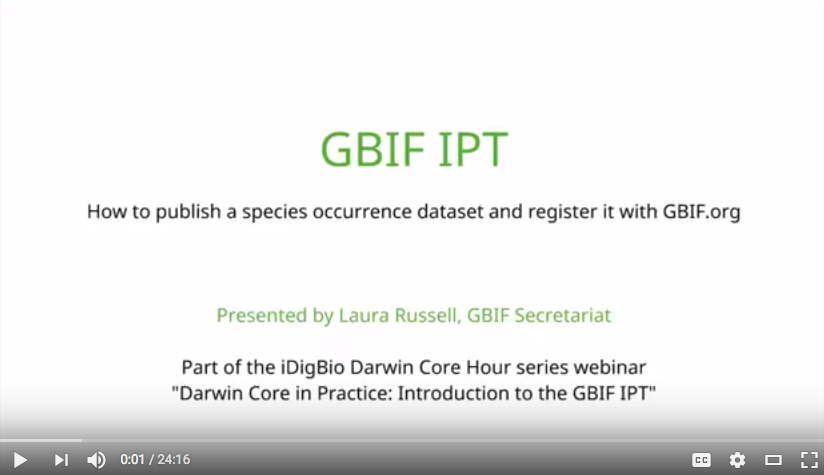Inside this repository you can find the IPT User Manual, FAQ and a variety of other valuable resources aimed at users, coders and translators. Do you have a question that you can't find the answer to? Then send your question to the IPT Mailing List to get it answered!
The Integrated Publishing Toolkit (IPT) is a free, open source software tool written in Java that is used to publish and share biodiversity datasets through the GBIF network. The IPT can also be configured with a DataCite account in order to assign DOIs to datasets transforming it into a data repository.
To understand how the IPT works, try watching this concise 25 minute live demo showing how a dataset gets properly published and registered through GBIF.org (if you are unable to watch the video in your country, it can also be downloaded directly):
Version 2.4.0 is available for download here, or via a CentOS repository.
Version 2.4.0 updates the integration with DataCite for assiging DOIs to datasets, has minor bug fixes and updates dependency versions to improve the robustness and security of the IPT.
Version 2.3.6 is available for download here. Version 2.3.6 improves coverage of translations, has minor bug fixes and updates dependency versions to improve the robustness and security of the IPT.
Version 2.3.5 is available for download here. Version 2.3.5 fixes cross site scripting vulnerabilities, and an issue that caused the dataset inventory web service request to fail.
Version 2.3.4 includes a security update that fixes a critical vulnerability that has been discovered in the Apache Struts web framework, which the IPT uses. According to this article, this is a remote code execution vulnerability that could allow hackers to execute malicious commands on the IPT server. It also says that hackers are actively exploiting this vulnerability. Therefore all users should plan to upgrade to this version immediately following the instructions in the Release Notes.
You can find out what features were added in version 2.3.3 in this blog post.
No release date has been set yet for the next release. Progress working on issues for the next release can be browsed here.
Minor issues and security issues will be addressed in patch releases.
If you're only interested in trying out the IPT please request an account on the Demo IPT by sending an email to [email protected].
The simplest way to begin using the IPT is to request a free account on a trusted data hosting centre allowing you to manage your own datasets and publish them through GBIF.org without the hassle of setting up and maintaining the IPT on your own server.
Otherwise if want to setup your own instance of the IPT the Getting Started Guide is your entry point.
Be sure to sign up to the IPT Mailing List, which serves as a support group for IPT users. It is essential that the IPT is kept up to date to be as secure and robust as possible, so if you are responsible for administering an IPT, then you should be signed up to be notified of new releases so that you can update immediately.
The core development of the IPT is directed by GBIF, but the coding is a community effort and everyone is welcome to join. Start by browsing the Open Issues to find something that you'd like to start working on. Kindly note that contributions are welcome in the form of a pull request using a branch or fork of the repository. Full instructions aimed at coders can be found here.
The IPT user interface and wiki both need internationalisation, but it's a community effort and everyone is welcome to join. Full instructions aimed at translators can be found here.
Thanks to an enormous community effort, and by leveraging the power of the Crowdin localisation tool, the user interface has already been translated into seven different languages: English, French, Spanish, Traditional Chinese, Brazilian Portuguese, Japanese, and Russian.
A large number of dedicated volunteers contribute to the success of this software. With your help, the IPT has become a successful tool in use all around the world.
Crowdin is kindly supporting this open source project by giving GBIF a free access to its localisation management platform. Crowdin makes it possible to manage a large number of concurrent translations.
